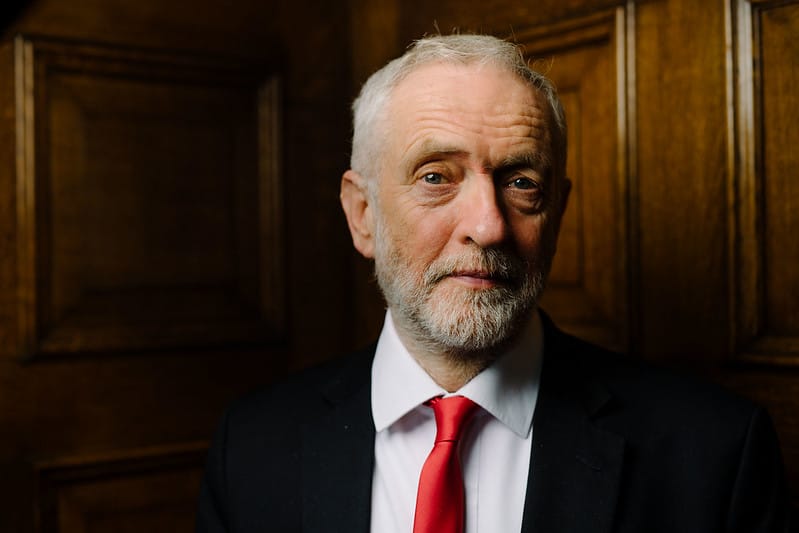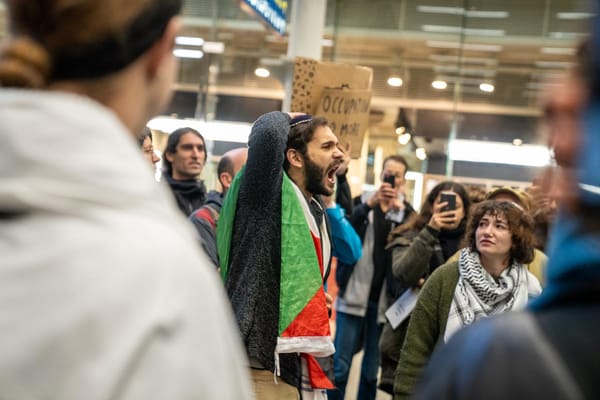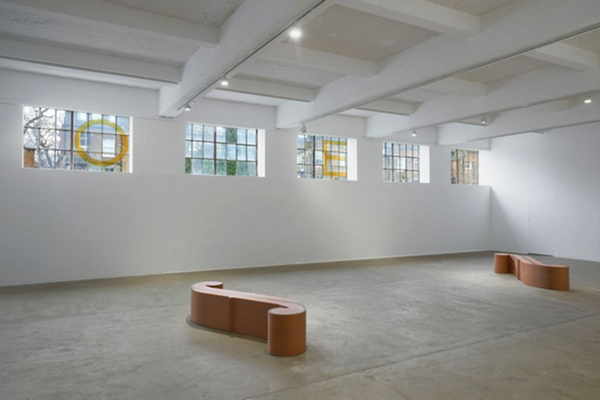Why I stand with Jeremy Corbyn
The former Labour leader understands far better than his successor, who suspended him this week, that racism is born of a broken world - one we must utterly transform.

Below is an edited transcript of a speech the author delivered at an event organised by Momentum on Friday. Watch it here.
There is a world you can find every morning in newspaper pages and every evening on TV news bulletins. It is a world of precarious stability, where your job, home and security are threatened by radicals with funny hair and funny clothes and foreign food. It is a frightened and a frightening world and for five years or more now, racism has been added to the list of threats from those dreaded radicals. The left, it is said, are a cabal of antisemites. On endless news reports, respectable figures shake their heads in horror and tell us this racist Corbynite cancer must be purged, while some on the left have insisted in response that there isn’t much racism at all. It is time to end this absurdity.
Britain is the land that housed its Black and Brown workers in the top floors of a London tower block so that when that block burned down, the faces of the dead were dark. That building, that bonfire, was named after Francis Grenfell, a colonial commander who massacred people in Ireland and Africa – and now the descendants of his victims will be remembered forever under his surname. That is Britain, the land whose government threatens to send in the full might of the navy against desperate people boarding makeshift dinghies in search of safety. This is Britain, whose Muslim communities are surveilled to test their compliance with “British values”.
If you think “Oh well yes, but antisemitism is different, our political masters are enlightened and tolerant of Jews”, then you should know that our prime minister wrote a novel replete with antisemitic caricatures of hook-nosed businessmen. You should know that Prince Charles, the heir to the throne, once complained that America is ruled by a Jewish lobby. You should know that Alastair Campbell once designed a national election campaign depicting his Jewish opponents as Shylock, Fagin and flying pigs. To think that racism is alien to these shores is to know nothing of Britain; and to say that the Labour Party has always been antiracist is to insult every asylum-seeking child pushed to destitution by the calculated decisions the Blair government took to appease the rightwing press, to prove Labour could be as tough on the poor and the foreign as their opponents. My first political activity was volunteering at my synagogue’s drop-in centre for refugees made homeless by a British Labour government.
The battle should not be over whether there is racism, but how to fight it – and I stand in a tradition that thinks the answer is a politics that prizes human dignity for all against the violence of empire and capital, understanding that miserable hatreds and prejudices are born of a broken world, a world we must utterly transform.
Corbyn supporters and the left are not immune from bigotry, either; I have spent a few years now as a British Jew saying that. The years since the financial crash have seen a serious rise in antisemitism – the result of a world of insecurity and alienation, where people on both the right and the left reach for easy, paranoid answers. The battle should not be over whether there is racism, but how to fight it – and I stand in a tradition that thinks the answer is a politics that prizes human dignity for all against the violence of empire and capital, understanding that miserable hatreds and prejudices are born of a broken world, a world we must utterly transform.
We are here tonight to stand with Jeremy Corbyn. Why? I hear he’s a nice man, but that doesn’t much interest me. What interests me is where he comes from, and what politicised him. He learned his radicalism in Jamaica as a young man. He was caught up in a wave of optimism as Michael Manley’s opposition on the island championed workers at home and alliances with Third World radicalism abroad. Manley wanted a minimum wage, free education, land reform, a war on illiteracy and an expanded democratic franchise; he went on to do all these things in office, and insisted that doing them required removing Jamaica from the suffocating orbit of the American state. Energised by Manley, Corbyn then travelled across South America. In Chile, he stood with thousands of others at a huge May-Day-demonstration-cum-Allende-rally. In his final speech of the last general election, Corbyn summoned the memory of a Chilean musician surely unknown to most of his young audience. Victor Jara, he told the crowd, sung of revolution until Pinochet’s men rounded him up, smashed his hands and guitar, and killed him. “My guitar is not for the rich – no, nothing like that,” Corbyn quoted. “My song is of the ladder we are building to reach the stars.”
Corbyn’s internationalism was born of a recognition of shared interests. From Chile to Algeria, London to Pretoria, radicals thought their fortunes were intertwined, that they would win together or go down in flames.
Such was the world that produced Jeremy Corbyn. So many column inches have bemoaned the weirdness of it, or mocked the madness of facing British voters with these arcane commitments to faraway places, but that gets it all wrong. Corbyn’s internationalism was born of a recognition of shared interests. From Chile to Algeria, London to Pretoria, radicals thought their fortunes were intertwined, that they would win together or go down in flames. They were right. The politics of class is now often contrasted to the politics of identity, but this was something much richer: a global 1968 whose universalism depicted patriarchy, neocolonialism and capital as constricting hierarchies to be swept away by the wretched of the earth. The goal was freedom from domination, to empower people everywhere to live standing up and not on their knees. The tabloid press of the 1980s loathed the “loony left” as much for championing gay liberation and Black power and women’s liberation as working-class emancipation.
This is why we care about Palestine. We care just as people all over the world were once inspired by the courage and fortitude of the people of Vietnam, who with limited means confronted enormous power and demanded their independence. It is what the people of South Africa did too through long years of prison and the policeman’s clubs. Today, in the last active site of settler-colonial violence in the world, against a network of checkpoints and blockades the people of Palestine speak to a current that runs through our blood too: the demand that human beings should live in dignity.
The ice caps are melting and the seas are rising and the forests are burning and the walls are mounting and it has never been truer that either we all win, or some of us burn, others drown.
These are the dreams that briefly occupied the mainstream of British life while Corbyn led the Labour Party, but they have always been there, far from the attention of journalists and commentators. They are the dreams of Saklatvala and CLR James, of Stuart Hall and Sivanandan. They are the dreams of every unknown and unnamed militant who ever shouted “Black and white unite and fight”, and faced down the miseries of division and hatred in the quest for a better world. We need to reinvent these traditions now for a thoroughly different world – but we need them still, and urgently. The ice caps are melting and the seas are rising and the forests are burning and the walls are mounting and it has never been truer that either we all win, or some of us will burn and others will drown.
So wear the badges of anti-imperialism and anti-capitalism and call them the badges of dignity, freedom and survival against a civilization that would burn down the world. Fight racism, fight antisemitism, and as you do, remember the words of the Torah: “Justice, justice you shall pursue”. ▼
Barnaby Raine is a writer and historian.




